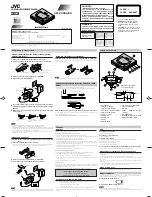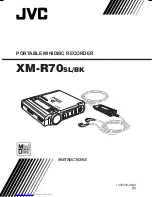
Placement
Use common sense when placing the RCD-951 in a cabinet or
when stacking other equipment. Make sure that the shelf or cabi-
net can support its weight. Do not stack heavy components on top
of the RCD-951. Avoid placing the unit where it may be subject to
excessive heat such as on top of a large power amplifier or near a
heat register. For best performance, avoid placing the unit where
it may be subject to vibration, such as near a speaker.
○ ○ ○ ○ ○ ○ ○ ○ ○ ○ ○ ○ ○ ○ ○ ○ ○ ○ ○ ○ ○ ○ ○ ○ ○ ○ ○ ○ ○ ○ ○ ○ ○
AC Power and Control
AC Power Input
20
Your RCD-951 is configured at the factory for the proper AC volt-
age in the country where you purchased it (either 115 volts or 230/
240 volts. The AC line configuration is noted on a decal on the
back panel.
Note:
Should you move your CD player to another country, it may
be possible to reconfigure it for use on a different line voltage. Do
not attempt to perform this conversion yourself. Opening the en-
closure of the RCD-951 exposes you to dangerous voltages. Con-
sult a qualified service person or the Rotel factory service
department for information.
The RCD-951 should be plugged directly into a 2-pin polarized wall
outlet or into the switched outlet on another component in your
audio system. Do not use an extension cord.
Be sure the power switch on the front panel of the RCD-951 is
turned off (in the "out" position). Then, connect the supplied power
cord to the AC power receptacle on the rear of the unit and the
AC power outlet.
If you are going to be away from home for an extended period of
time such as a month-long vacation, it is a sensible precaution to
unplug your CD player (as well as other audio and video compo-
nents) while you are away.
Power Switch
8
and Power Indicator
1
The power switch is located on the front panel of your CD player.
To turn the CD player on, push the switch in. The LED indicator
above the switch and the Display will light up, indicating that the
CD player is turned on. To turn the CD player off, push the button
again and return it to the "out" position.
Note:
If you are using a switched outlet to turn on and off your
CD player, you should leave the power switch in the "on" position.
When AC power is applied to the unit, it will power up in fully ac-
tive mode.
○ ○ ○ ○ ○ ○ ○ ○ ○ ○ ○ ○ ○ ○ ○ ○ ○ ○ ○ ○ ○ ○ ○ ○ ○ ○ ○ ○ ○ ○ ○ ○ ○
Output Connections
The RCD-951 gives you a choice of two different kinds of output
connections — an analog output signal from the built-in D/A con-
verter for use with conventional analog audio components and a
coax digital output which provides an unprocessed digital data
signal for use with outboard D/A converters or digital processors.
Note:
To prevent loud noises that neither you nor your speakers
will appreciate, make sure the CD player is turned off when you
make any signal connections.
Analog Outputs
18
[See Figure 2 for wiring illustration]
A pair of standard RCA jacks supplies an analog output signal
from the RCD-951 to the source inputs of an audio preamplifier, in-
tegrated amplifier, or receiver.
Select high quality audio interconnect cables. Connect the left
channel output of the RCD-951 to the left channel source input on
the preamplifier or other component. Connect the right output of
the RCD-951 to the right channel source input on the preamplifier
or other component.
Digital Output
19
[See Figure 3 for wiring illustration]
If you are using an outboard D/A converter or other digital proces-
sor, you will need an unprocessed digital data stream from the
RCD-951, taken before the built-in D/A converter. This signal is
supplied by the RCD-951’s back-panel digital output jack.
Using a standard 75 ohm coax digital cable, connect the
RCD-951’s coax digital output to the coax digital input connector
on the outboard D/A converter.
○ ○ ○ ○ ○ ○ ○ ○ ○ ○ ○ ○ ○ ○ ○ ○ ○ ○ ○ ○ ○ ○ ○ ○ ○ ○ ○ ○ ○ ○ ○ ○ ○
Operation
The RCD-951 can be operated using its front panel buttons or from
corresponding buttons on the supplied infrared remote control.
Specific instructions for each of these controls are detailed be-
low. Most of the buttons are duplicated on the front panel
and on
the IR remote control. However, there are a few exceptions where
the buttons are only available on one or the other. These excep-
tions are noted in the instructions.
2
STEREO COMPACT DISC PLAYER RCD-951




























